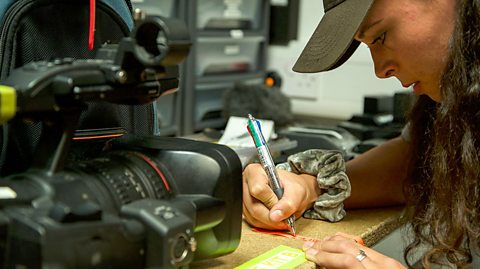Are you considering freelancing? We've asked some young, brilliant #ownbosses to bust some myths and tell you what it's really like.
Myth 1: You will be lonely
Think if you are freelance you need to work in isolation? Not necessarily. Often, freelancers are still in an office setting, working within a team. Many are invited to work for companies in their offices, or they get to travel with a broader team to work on a project. And if you don’t like to work from home, you could find co-working spaces near you. These have the feel of shared office, but with other people working on their own projects.
"Freelancing is not just for introverts or people who want to be alone – you can be social and dynamic!" says Rosie, a freelance private science tutor. "I get to interact with lots of different people in lots of different environments," she adds. "It was what attracted me to freelancing in the first place."
And if you're feeling a bit isolated, don't be afraid to ask for help - perhaps working with a mentor, your client, or your peers to collaborate and find solutions to problems.

Myth 2: You’re the boss, so you can do whatever you like
As a freelancer, in theory you work when you want to, with who you want to. However, never forget you also need to find and secure that work on your own. Managing your time, workload, contracts, tax returns, and finances is not necessarily easy.
"Being your own boss is great, but it also means you can’t complain to anybody else," explains Rosie.
You’ll need to be disciplined with yourself, set goals and meet them.
"Not every client will be the same and you will have to be flexible, at least when starting out and building your experience, contacts and options," adds Ben, who freelances in marketing. So keep an eye on the procrastination and dial up the flexibility.

Myth 3: You can never take a break
Ok, so you’re not likely to work a typical 9-5 as a freelancer. And, because your holidays won’t be paid for, you may feel that you can never stop working. EVER! This is not true, or healthy. It’s all about managing your time and income well enough to allow for breaks. Those breaks are also essential to refresh your mind and allow your creativity to flow.
Ben explains: "I have to get my work done and deliver on time, but I can also take the occasional afternoon off as a rest when I need it. It’s a balance of freedom and responsibility."
Your time may be restricted to your clients' timetable, your workload can vary from week to week, including some long hours, so you’ll need to strike a balance and take breaks when you can.

Myth 4: Your experience will speak for itself
Your previous work and CV will help you secure work, but you’ll also need to become a master of networking, an expert on following up meetings and leads, and a relentless detective chasing that future project or commission. Not all freelancers are equal: it depends on availability, location, expertise, clients and area of work.
Ben explains: "You may be competing against lots of other people and companies for work, sometimes internationally."
Networking is essential as you may have to pitch for work and negotiate your own contract. You’ll need to build contacts, perhaps using business cards and web presence to establish new connections.

Myth 5: You’ll never make enough money
Payment can vary from project to project and you will have to negotiate your own rates, but as you build experience and a portfolio you should be able to charge more for your services.
According to Aine, an independent environmental consultant, you need to "know your pace and your ambitions, how much you want to be paid and how many companies do you want to work for. You need to be able to manage the work and get it done."
Remember the national minimum wage when you start out, and make sure you won’t have to spend too much time on something that won't pay you enough per hour. Being efficient and self-disciplined will save you time and money.

Myth 6: You’ll only do low-skilled work
Freelancing is definitely not just for low-skilled work. Different projects require different qualifications and levels of experience, and freelancing shouldn’t be seen as a second choice for people who tried to be employed in a certain area. It can offer more flexibility if you need to work alongside studying and other life commitments.
"You’ll need to be an expert in everything, including IT skills," explains Aine. "I often get asked to help with things outside of my remit. You need to know more than other people."
Some people recommend you are employed in a certain area first before you offer freelance services, as this gives you credibility with clients. This can be tricky, especially if you're trying to get your first big gig in an industry, or if you're changing careers altogether. Remember many types of experience, from personal projects to volunteering, can count towards your overall CV.

Enjoyed this? Check out our young freelancers' top tips on working for yourself.
Tamsin: camera operator
Tamsin makes films and TV shows.

Chris: volcano vlogger. video
Chris explores volcanoes as a job!

Poppy: beauty retail business owner
Poppy runs her own skincare business online.
